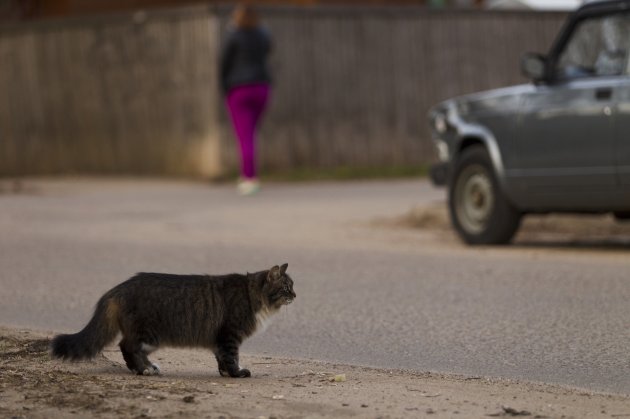The feline species may come off as calm and collected but there are still some things that can take the most cool-as-a-cucumber nature and turn it into a freaked out “fraidy cat.”
Read on for the top 11 things that cause fear and anxiety in cats - what’s your feline afraid of?
1. Dogs
The rival between cats and dogs has been going on since the dawn of time. Whether it be because cats have an air of superiority when it comes to the canine species, or that it’s just because dogs tend to bark and kick up a fuss when they spot a cat. Either way, cats that have not been raised or exposed to dogs can make their fears very well known. This can include puffing up their fur, arching their backs, hissing, growling, and lashing out.
Tip: To avoid fear in your cat, always put your feline in a separate room away from a visiting pooch.

2. Strangers
Cats that have not been properly socialized as kittens may have fear and anxiety when it comes to newcomers in your home. This can force your feline friend to run away and hide every time someone comes to the door. If this describes your cat, allow your pet time to adjust to the newcomer. Never force your pet to be cuddled, held, or restrained by a “stranger”, as this will only make matters worse.
Tip: To help forge a relationship with a cat, move slowly, speak softly, and use its favorite treats
3. Loud Noises
The cat’s sense of hearing is considerably better than ours. This helps them stay safe and hunt for food in the wild. However, when we domesticated this species, we failed to take into consideration the modern-world noises that come with daily life. Sounds such as a running vacuum cleaner, a blender, emergency vehicle sirens, firecrackers, or any abrupt sound can cause quite a fright in the feline species. If your cat has demonstrated a fear reaction to certain sounds, try to avoid making them in its presence.
Tip: If your cat is extremely sensitive to a variety of noises, try using a calming spray to help relax it’s nerves.
4. Illness
Sickness and pain can be a source of anxiety and fear in cats. Not only does your pet not feel well, which usually means it may not be eating or drinking as usual, but necessary vet visits and medications can also be very stressful.
Tip: Make your cat extra comfortable when it’s sick by providing it with a warm, quiet place to rest.
5. Cars Rides
Unlike our canine companions that love to have the wind blowing back their ears while their heads are stuck out the window zooming down the highway, cats don’t usually enjoy car trips. Whether the stress comes from being confined in a kennel, the movement of the vehicle or the destination itself (which may also be unpleasant, ie. veterinarians or groomers) your cat’s anxiety can manifest as howling, meowing, or even vomiting or diarrhea.
Tip: Draping a light towel or blanket over your cat’s kennel when in the car can help reduce some stress and fear.

6. Water
Even though some cat breeds adore the wet stuff, most other felines detest water and will avoid it at all costs. Why? One theory states that since the feline species evolved in the desert and arid climates, they didn’t adapt to rivers, ponds, or heavy rainfall. Another reason cites that cats are very meticulous and having a wet coat is more difficult to keep groomed.
Tip: If you do have to bathe your cat, enlist the help of another person, preferably one your cat likes.
7. Veterinarians and Groomers
Both veterinarians and groomers perform unpleasant tasks on our cats. Therefore, it shouldn’t be a surprise that a visit to these professionals will trigger a great amount of fear and anxiety in our furry friends
Tip: Find a vet and groomer that you like and are comfortable with - cats can perceive when their pet parents are uptight.
8. Changes in Routine or the Household
Cats are creatures of habit, so any change in their routine or household is enough to stress them out. This can include a new baby, a new pet, house guests, or even something as simple as a new piece of furniture or rearranging the existing furniture.
Tip: Always provide your cat with a quiet place to escape from the hustle and bustle of new family members and try to stick as closely as you can to feeding schedules.

9. Bullying from Other Pets or People
Cats are territorial and will fight to claim and keep their outdoor boundaries. However, in a multi-cat household, indoor cats can also try to dominate each other. Meek cats may become the target of bullying from more aggressive members of the “clowder,” which will create a very stressful environment.
Loud, or dominant people may also feel they can bully an animal. In this case, the cat will become extremely fearful and will hide from their abuser.
Tip: If you have a dominant pet or person that is bullying a cat, it may be best to re-home the animal or keep them separated.
10. Unclean Litter Box
Cats are very meticulous and clean, so a filthy litter box can create anxiety in the animal, to the point where the cat will seek other spots to do its business in. If you have trouble keeping a litter box clean, try a self-cleaning unit that automatically “sweeps” the soiled litter into a receptacle after each use.
Tip: Don’t use strong-smelling chemicals or vinegar to wash your cat’s litter box - strong smells can also create anxiety in the feline species.
11. Harsh Punishment
Hitting, yelling, or using any other harsh means of punishment with your cat (or any animal) is not a good idea. According to experts, this will only lead to your pet mistrusting and fearing you. Plus, when the animal is afraid, it can also lead to aggressive behavior or soiling outside the litter box.
Tip: If your cat has an extreme behavioral issue, you may need to enlist the help of an expert animal behaviorist or veterinarian.
Conclusion
Regardless of what your cat is afraid of, try your best to identify the cause, then reduce the amount of stress and fear that your pet is experiencing. Whether you need to add some calming spray to your pet’s favorite bed or create a whole space for your Kitty to unwind in, getting your pet to relax will keep it healthier and happier.
Further reading:
- Cornell University College of Veterinary Medicine.Feline Behavior Problems: Aggression
- The New York Times. Fear-Free Pets Make for Happier Pets, and Owners
- Cummings School of Veterinary Medicine at Tufts University. Mood-Stabilizing Medications for cats